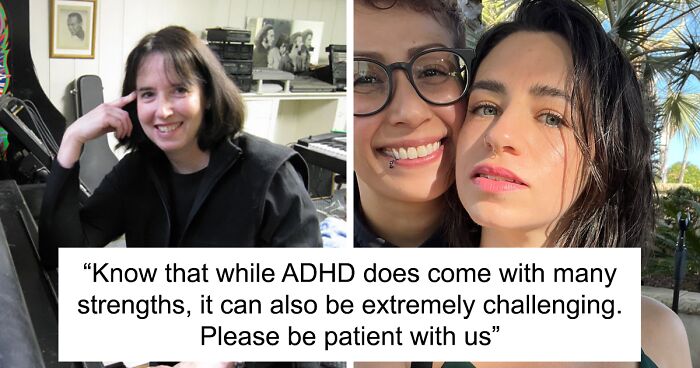
ADHD Diagnoses Are Skyrocketing In Women Due To Recognition Of Gender-Specific Symptoms
Interview With ExpertADHD diagnoses are booming, leading to increased demands for tests and prescription medications across various public health sectors. Within this surge, a troubling gender bias has emerged, as female patients often endure delayed diagnoses, revealing systemic disparities in recognizing ADHD in women.
Attention deficit hyperactivity disorder (ADHD) is a condition that affects people’s behavior, the National Health Service (NHS) explains. People with ADHD can seem restless, may have trouble concentrating, and may act on impulse.
- ADHD diagnoses in adult women nearly doubled from 2020 to 2022, spotlighting a gender bias in recognition and treatment.
- Jaklin Levine-Pritzker was diagnosed with ADHD at 32 and Emilie was diagnosed at 25. They both shared their experience with Bored Panda.
- Psychotherapist Terry Matlen, specializing in ADHD in adults with a special focus on women shared her expertise.
Symptoms of ADHD tend to be noticed at an early age and may become more noticeable when a child’s circumstances change, such as when they start school, as per the NHS.
With this in mind, ADHD has previously been stereotypically associated with “hyperactive” boys, therefore leading to women spending a lifetime having to cope with an undiagnosed and untreated neurological disorder.
“I got diagnosed in my mid-twenties in law school,” 32-year-old Jaklin Levine-Pritzker told Bored Panda in an email.
“I was diagnosed at the age of 25,” 31-year-old Emilie from Geneva, Switzerland, said via an Instagram direct message to the publication.
Levine-Pritzker and Emilie (who chose to keep her last name private) are part of a global phenomenon that has now been studied, as exemplified by Epic Research, an organization that analyzes electronic medical record data.
The study looked at more than 3 million patient records nationwide and found an increase in new ADHD patients, especially women, CBS News reported in February.
Consequently, researchers found that while the overall incidence of ADHD remains small among adults (less than 1%), with kids more commonly diagnosed, the percentage of adult women newly diagnosed nearly doubled from 2020 to 2022.
ADHD diagnoses surged, revealing a gender bias in delayed recognition among adult women
Image credits: Andrey Popov/stock.adobe.com
Some may blame TikTok as a tool for self-diagnosis, and others may point fingers toward the Covid-19 pandemic, which led to a lot of soul searching, but another possibility for the unprecedented increase in ADHD diagnoses in women may simply be related to psychiatry finally catching up.
When Clinical Psychologist Kathleen Nadeau co-authored Understanding Girls with ADHD in 1999—one of the first real attempts to characterize how ADHD appeared in young girls—the research community still thought of ADHD almost exclusively as a “boy disorder,” National Geographic reported in January 2024.
Although there have been some shifts in this perspective, the vast majority of ADHD research has historically focused on boys and men, contributing to the prevalent stereotype of ADHD being hyperactive and disruptive primarily in boys, a paper published by the American Psychological Association argued.
“More and more is being written about women and ADHD (though certainly not enough studies are being done), so women are recognizing themselves in articles they are reading and reaching out to professionals to get evaluated,” Psychotherapist Terry Matlen told Bored Panda in an email.
Matlen is an expert on ADHD in adults, with a special focus on women. She observed many women came to understand their disability during the pandemic, as she explained: “It was [often] due to feelings of overwhelm [when] working from home, especially when children were at home and needing support from parents for keeping up with school obligations.”
The nationally recognized speaker on ADHD continued: “That put many women into a tailspin of anxiety and depression, and in many cases, complete shut-down.
“They reached out for help, and many, ultimately, were diagnosed with ADHD.”
In an exclusive interview, Terry Matlen, a psychotherapist specializing in women with ADHD, spoke to Bored Panda
Image credits: Provided by Terry Matlen
Symptoms of ADHD in adults, while often subtler than those in children and more difficult to define due to a lack of research into adults with ADHD, include difficulties in attention, organization, and impulse control, with manifestations such as restlessness, mood swings, and impatience, potentially impacting various aspects of daily life, according to the NHS.
“Women with ADHD often present differently from men with ADHD,” Matlen said. “Women tend to internalize their symptoms, i.e., feeling overwhelmed, anxious, depressed, self-medicating with food and/or substances like alcohol/drugs, being attracted to addictive behaviors like excessive shopping, daydreaming, not able to manage household tasks, excessive talking, etc.”
The mental health expert acknowledged that while men may also exhibit these traits, some gender-related behaviors were specific to women with ADHD.
“Women with ADHD often describe their lives as overwhelming,” Matlen explained. “They may struggle more with eating disorders. They complain of feeling fatigued, and often, we see sleep disorders as well. Women might be drawn to more internal experiences, such as writing poetry, listening to music, feeling emotions very deeply.”
On the other hand, the psychologist noted that men may exhibit more “external hyperactive/impulsive behaviors like erratic driving or even be attracted to race car sports, skydiving, downhill mountain biking, etc.”
“Women with ADHD often present differently from men with ADHD,” Matlen said
Image credits: Provided by Terry Matlen
“My concentration runs for a maximum of 30 minutes, with the exception of when I do something that I am really passionate about, like music, or reading something very captivating,” Emilie, who works as a social worker specializing in children with disabilities, said.
She further stated: “I fall quickly into addictions. I get bored easily with just about everything. I’m not consistent. Without a routine or a disciplined lifestyle, I can struggle with anxiety and depression.”
Levine-Pritzker runs the popular Authentically ADHD Instagram page, in which she details her symptoms and raises awareness about the disorder.
She described how ADHD presented itself in her life, noting: “For me, ADHD feels like contradiction and paradox.
“Highs and lows. Being hyperfocused or not at all. Extremely variable energy, capacity, and mood.
“Incredible follow through when interested, and major inertia when not.
“So many ideas, creativity, excitement.”
Levine-Pritzker and Emilie suffered, to a certain extent, from a late diagnosis, as many other women do.
“By the time a girl has reached womanhood without the benefit of a diagnosis/treatment of ADHD, there’s a huge risk of her turning those early (and often negative) experiences into other mental health challenges: depression, anxiety, substance abuse, eating disorders, even PTSD (post-traumatic stress disorder),” Matlen said.
She continued: “As they search for ways to improve mood, for example, [this] could lead to substance abuse.
“As the need for brain stimulation may occur, [this] could lead to dangerous behaviors, such as unhealthy, unsafe sexual behaviors, etc.
“In addition, we see educational failures. Girls in school may give up as they can’t sustain their attention, leading to poor grades and worse.
“As they get older, they are now under-employed, working at jobs they hate because they don’t match their interest, and if they didn’t go to college or trade school, they are stuck in a lifetime of unfulfilled career choices.”
“Women with ADHD often describe their lives as overwhelming,” Matlen explained
Image credits: Provided by Terry Matlen
Emilie admitted that she had always known that something was “different” about her prior to her late diagnosis. “I struggled to integrate myself, to preserve my friendships. I felt lonely, and I couldn’t be myself without risking being rejected by friends.”
The Swiss musician only saw academic success upon immersing herself in social studies, a discipline she said she was completely passionate about.
“I am someone who is able to mask (for example, even though my instinct is to interrupt, I won’t),” Levine-Pritzker said.
Masking is when a person with ADHD acts in a “socially acceptable” way to fit in and form better connections with those around them, the Attention Deficit Disorder Association explains. This usually involves camouflaging their symptoms by controlling their impulses, rehearsing responses, and copying the behaviors of those who don’t have ADHD.
As a result of masking, many people didn’t realize Levine-Pritzker had ADHD. Eventually, the content creator who works as an ADHD coach in California noticed a pattern: “A lot of my challenges just got chalked up to ‘being like my Dad’ (who I also think [has] ADHD lol) and things not getting to a critical point until responsibilities piled up.”
According to Medical News Today, someone who continuously masks and excessively worries about their behaviors can become exhausted and start to suffer from other negative effects.
“I got diagnosed in my mid-20s in law school,” Jaklin Levine-Pritzker, who runs the Authentically ADHD Instagram page, told Bored Panda
Image credits: authenticallyadhd
“Sadly, many clinicians still are not ADHD-savvy, and many, many women I’ve worked with had been misdiagnosed with having depression,” Matlen said. “Granted, many women with ADHD do have depression, but it’s often not the primary diagnosis.”
Growing up with undiagnosed, untreated ADHD can lead to other mental disorders, such as depression and anxiety, which can, in turn, mask the underlying ADHD.
“Imagine struggling your whole life—having difficulties in school, in your family, in relationships—and being told it was due to depression,” the psychologist challenged. “Sure, you may appear in the office depressed *because* of these lifelong struggles.”
The mother to two children (one of whom has ADHD) added: “You are then evaluated and treated for depression but don’t find any or very little improvement.
“Years can pass, [and] you move through life not understanding why things are so difficult for you.”
This clinical history is very important to consider when diagnosing an adult with ADHD “in order to get a good picture of current and past functioning and impairment and to make a differential diagnosis.” Matlen explained.
Levine-Pritzker opened up about her late diagnosis, along with Emilie from Switzerland, who was also interviewed
View this post on Instagram
The psychologist who runs the online coaching group for women with ADHD Queens Of Distraction emphasizes assessing whether a person’s symptoms suggest ADHD or other conditions like depression or anxiety.
Matlen also suggested privately interviewing those in close proximity to the patient suspected of having ADHD, such as a partner or a parent, “to get a better sense of early and current behaviors and challenges and to corroborate the information gathered by the client.”
ADHD diagnoses are complicated and differ from clinician to clinician and from country to country. Nevertheless, they typically include rigorous self-assignment questionnaires and lengthy psychological evaluations.
A person may also be asked to undergo an electrocardiogram and take a blood test to check for irregular sleeping patterns, heart conditions, vitamin deficiencies, as well as thyroid disorders.
“I went to therapy for problems related to addiction when my psychologist suggested that I should do a test because she suspected I had ADHD and, therefore, recommended a psychiatrist,” Emilie recalled.
She said: “I filled out a lengthy questionnaire spanning several pages, asking questions about my behavior since childhood, reactions to certain things, especially injustices, and how I was in school.”
One of the several existing self-assignment questionnaires to help diagnose an adult with the disorder is the Adult ADHD Self-Report Scale. However, one can’t diagnose a person solely based on these types of forms.
Moreover, questionnaires, which can be found online, as well as self-identification through someone else’s description of the symptoms, can lead to dangerous misdiagnoses.
“Social media has taken this and run with it: that women can have ADHD,” Matlen noticed. “Unfortunately, a lot of the posts on social media, particularly on TikTok, share misinformation, especially by suggesting that certain behaviors and difficulties can mean one has ADHD.”
“For me, ADHD feels like contradiction and paradox,” Levine-Pritzker said
Image credits: authenticallyadhd
The psychologist warned: “These are generally posted by young non-professionals, and now, we are seeing lots of women who claim they have ADHD when they’ve not been seen by a mental health professional who can evaluate them.”
Matlen did, however, acknowledge social media’s role in raising awareness of the disorder. She added: “On the other hand, misinformation can be devastating, too, in that women with, say, depression, etc., might attribute it to ADHD instead of getting the proper treatment they need.”
The expert pointed to an online self-test developed by the pioneer in the field of women with ADHD, Sari Solden, stressing: “It’s important to know that one cannot self-diagnose by screening tests, articles, webinars, and the like.”
Standard treatments for ADHD in adults typically involve medication, education, skills training, and psychological counseling, the Mayo Clinic states. Products that include methylphenidate or amphetamine are the most commonly prescribed medications for ADHD.
ADHD medications work by increasing the levels of important chemicals (neurotransmitters) in a person’s brain, Cleveland Clinic explains. These neurotransmitters include dopamine and norepinephrine.
Ultimately, increasing the amount of these neurotransmitters helps improve a person’s attention span, reducing their hyperactivity, controlling their impulsive behavior, and managing their executive dysfunction.
“At first, I was taking medications, and it wasn’t easy during the first month,” Emilie said. “Then, my brain and my body got used to this new chemistry, to having dopamine at a normal and stable level, and I finally got to have a more ‘normal’ life.”
She stopped taking her treatments to preserve ADHD traits that she felt were a part of her personality.*
The social worker recalled: “When I stopped taking medications, despite the difficulties, I managed to change my lifestyle and adopt a new lifestyle that was more aligned with my needs, feeling in more harmony with myself.”
Emilie admitted that she had always known that something was “different” about her prior to her late diagnosis
Image credits: authenticallyadhd
Emilie admitted that her diagnosis and treatment contributed to significantly improving her life, without which she would have been left in the unknown and grappling with self-confidence issues.
“I mostly take care of my ADHD self by designing a life that actually works for my needs, unlearning neuronormativity, having verbal processing support, having accommodating people in my life, and using tools when needed,” Levine-Pritzker said.
Gender bias has arguably affected many women in their late diagnosis journey, as Emilie revealed: “I believe that being a woman has created a sexist response from the teaching and medical communities, a stereotypical mechanism where it’s assumed that as a girl, it’s typical of her age/gender to believe she’s interesting, seek attention, and want to be different.”
She unveiled: “They told my parents that it was their fault, while they told me, ‘You’re not really smart.’
“I think that if I was a boy, it would’ve been normalized but valued. For girls, it’s normalized and demeaning.”
According to Matlen, there are many myths and stigmas surrounding ADHD in adults and, in particular, women with ADHD: “Many women finally learn that their struggles aren’t about being lazy, incompetent, or ‘weird.’”
“Many women I’ve worked with had been misdiagnosed with having depression,” Matlen said
Image credits: authenticallyadhd
She underscored: “Many, if not most women with ADHD, especially those who have not sought out therapy, live their lives in tremendous shame (‘Why is everything so hard? Why can’t I even keep up with the laundry?’).”
“We’re not less or worse. We just function differently,” Levine-Pritzker exclaimed before recommending that people help accommodate “our challenges while holding us accountable and celebrating the hell out of our strengths—we have a ton!”
The coach reiterated: “Also know that while ADHD does come with many strengths, it can also be extremely challenging. Please be patient with us.”
Matlen encouraged fellow mental health clinicians and healthcare providers to familiarize themselves with the discussed signs for when women seek help.
“One of the biggest problems I face as someone who has been in the field for over 25 years is knowing that there continues to be very few clinicians who really understand women with ADHD,” the therapist said.
Finally, Matlen emphasized the importance of women seeking a consultation with a clinician if they suspect they have ADHD, preferably one specializing in adult ADHD and with expertise in working with women.
She further cautioned against diagnoses concluded after “20-minute sessions.”
*The statement does not align with the stance of Bored Panda, which emphasizes the importance of seeking appropriate treatment for conditions like ADHD.
Poll Question
Thanks! Check out the results:
Explore more of these tags
I wasn't diagnosed with ADHD until I was in high school. Years of thinking I was just lazy and unmotivated. Nope, there actually was something going on :/ (i'm on meds now)
In the early 1980s, men who tested positive for HIV had life expectencies measured in years, while women's life expectencies were in months. Why? Because idiot doctors ignorantly looked for male symptoms in women, instead of looking of women-specific symptoms. The same goes for heart attacks, women have different symptoms than men.
I wasn't diagnosed with ADHD until I was in high school. Years of thinking I was just lazy and unmotivated. Nope, there actually was something going on :/ (i'm on meds now)
In the early 1980s, men who tested positive for HIV had life expectencies measured in years, while women's life expectencies were in months. Why? Because idiot doctors ignorantly looked for male symptoms in women, instead of looking of women-specific symptoms. The same goes for heart attacks, women have different symptoms than men.

 Dark Mode
Dark Mode 

 No fees, cancel anytime
No fees, cancel anytime 






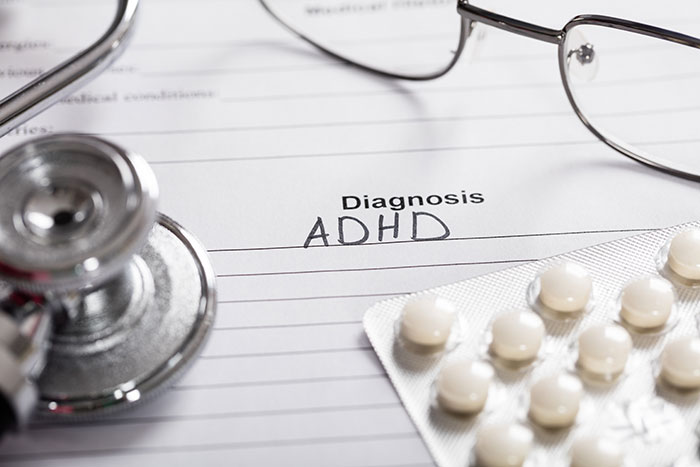
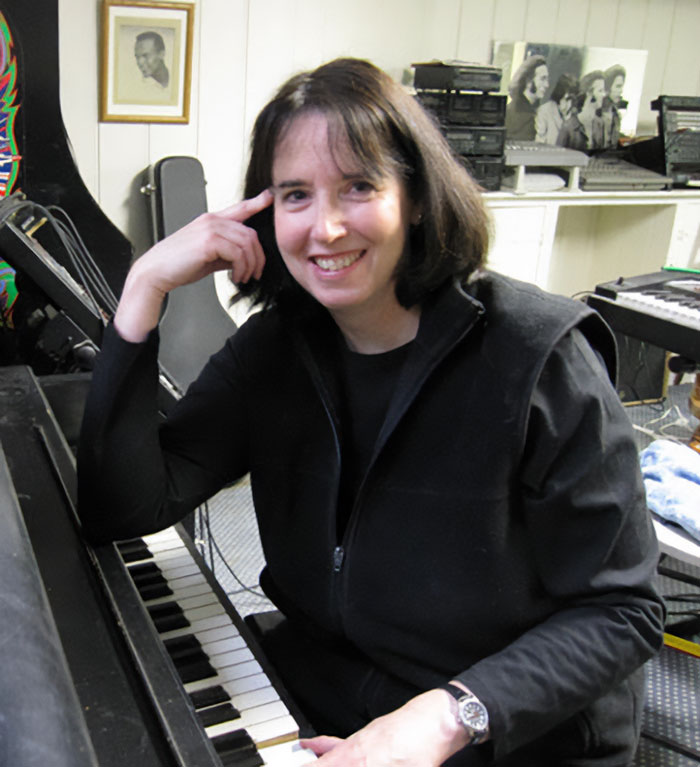
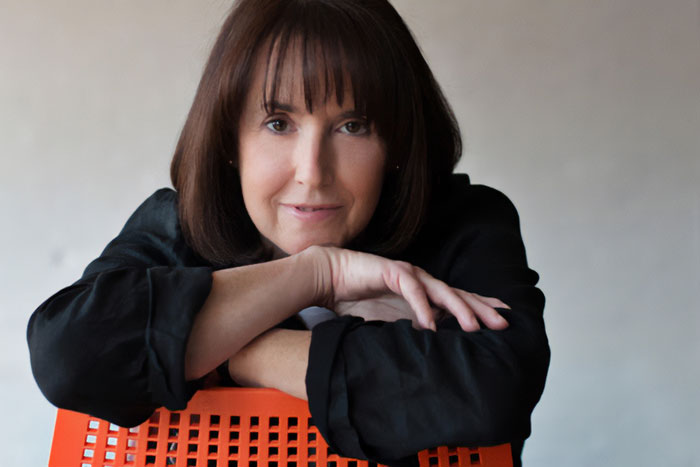
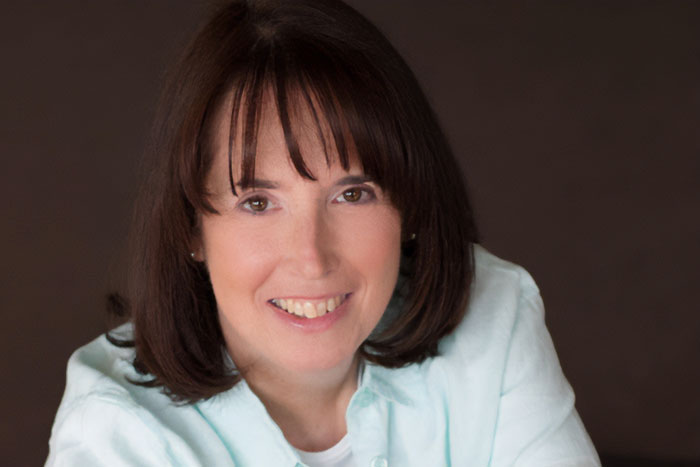

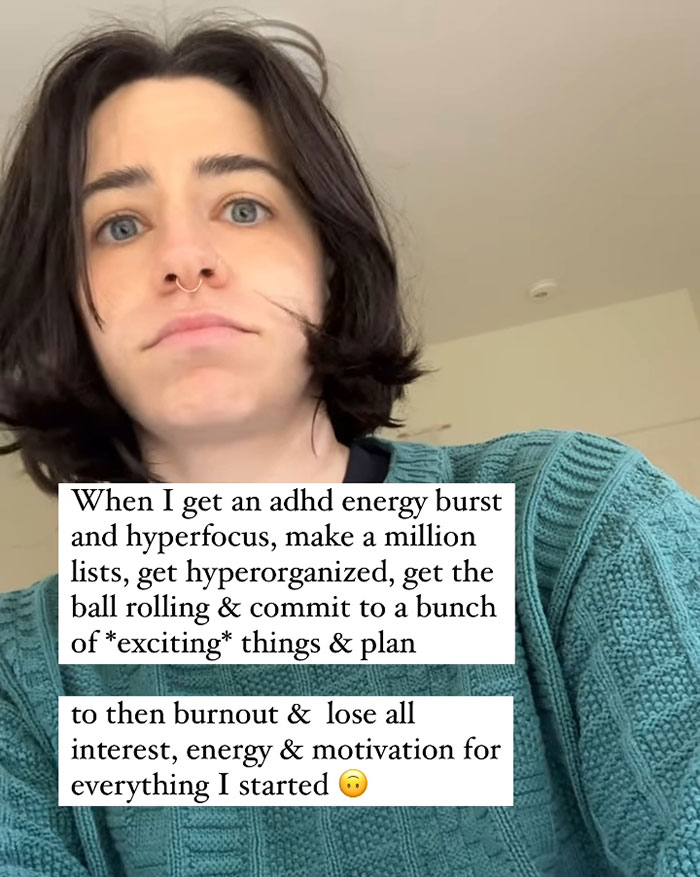
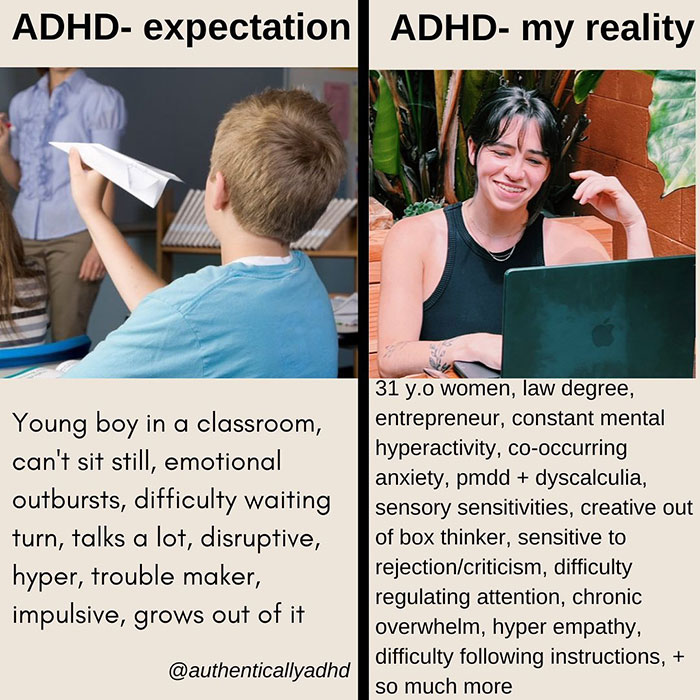
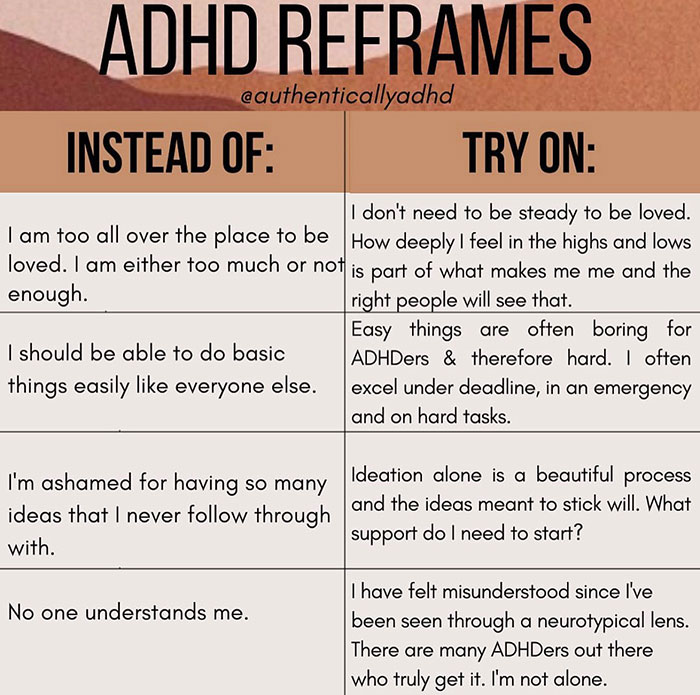











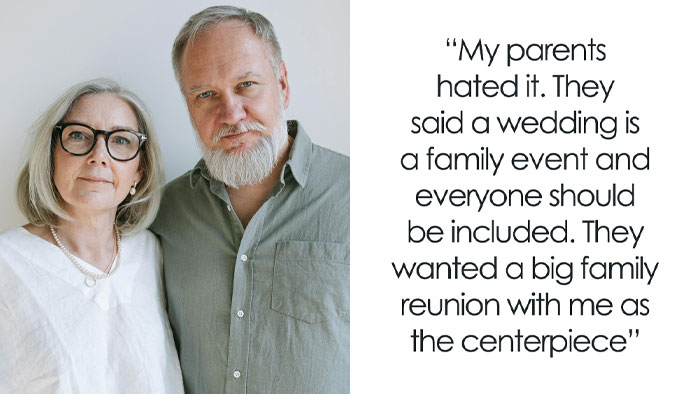

























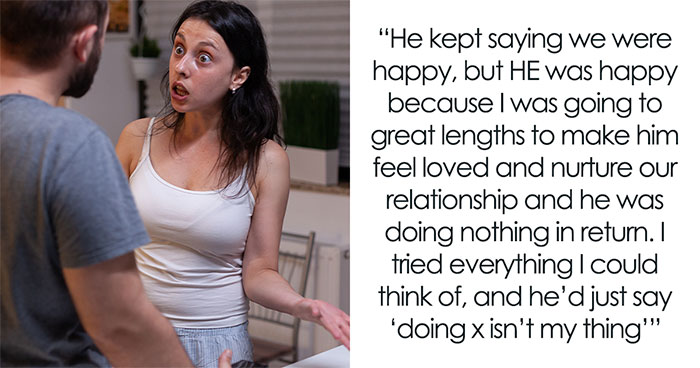





53
25